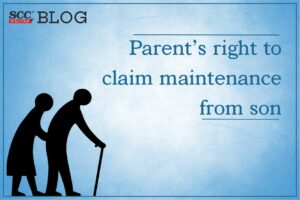In 2013, Gujarat High Court addressed a case wherein a son audaciously suggested that his parents should move to and stay in an old-age home instead of claiming an order of “care, protection and maintenance”.
The petitioner who was the father along with his wife used to live in the village and were not keeping well, health-wise, hence they claimed in the Court that their son shall be directed to provide proper maintenance, care and protection.
Father alleged that his younger son does not help him and his wife in any manner and he also does not provide for their maintenance.
From the opposing application, it emerged that the expenditure towards medicines of the applicant and his wife were being reimbursed, however, the applicant had emphatically denied and asserted that the said expenses are not being reimbursed and he has to meet with all expenses including the expenditure towards medicines for himself and his wife out of his pension-amount and he does not have any other income/source of income except pension.
It was not in dispute that the respondent does not stay with his parents and from the material on record it does not come out that he is extending any care or help to his parents and/or he does not provide for, or does not even contribute anything for, their maintenance.
High Court noted that the father does not receive any monetary help from his children and he does not have any other income to maintain himself and his wife to meet with their regular domestic expenses as well as the expenditure towards their medicines.
Additionally, the Court expressed that the applicant and his wife do not get any physical or emotional care, protection and support or any monetary help from their two children and their families.
Section 4 of the Act prescribes that the obligation of the children or the relative to maintain parent or senior citizen extends to the “needs” or parent’s or senior citizens so that he/they may lad a “normal life” and the conferment of the right to claim maintenance under the Act is not restricted qua only biological or adopted children but it is also extended, in specified cases, qua relative/s as well.
The above-said obligation was not restricted only to provide bare minimum maintenance, but the Act imposes obligation to also provide “all needs” of such citizen so that he may lead a “normal life” and to also provide food, clothing, residence, medical attendance and treatment.
The above-said expression ‘lead normal life’ would include all requirements of parents, i.e., physical needs as well as emotional needs.
It is pertinent that the pecuniary limit as regards the amount which can be awarded as maintenance allowance does not regulate the provision under section 4 of the Act and the provision under section 4 of the Act is not dependent on section 9 or pecuniary limit prescribed by the Rule 5 of the said Rules. It is neither the scope nor effect nor object of section 9 to regulate and/or restrict the scope or operation of Section 4 of the Act.
Parents’ right to Maintenance
High Court expressed that,
The right of the parent or senior citizen to make an application for maintenance, if such parent or senior citizen is not able to maintain himself from his own earning cannot be denied/taken away or curtailed by applying and superimposing the pecuniary limit prescribed for the purpose of Section 9 of the Act.
Further, with regard to awarding more amount, Court held that the applicant has to satisfy the competent authority that having regard to his requirements to lead a normal life as contemplated under Section 4 of the Act, his income is insufficient and he needs more amount/assistance from his children so that he can maintain himself and lead a normal life.
“…merely because, income of the applicant appears to be more than the pecuniary limit prescribed for the purpose of section 9 of the Act, the authority cannot refuse to entertain and decide an application and pass appropriate order.”
The petition was accepted and allowed.[Parmar Dahyabhai Hemabhai v. Parmar Prakashbhai Dahyabhai, 2013 SCC OnLine Guj 749, decided on 4-3-2013]
Advocates before the Court:
MR YH MOTIRAMANI, ADVOCATE for the Petitioner(s) No. 1
MS E.SHAILAJA, ADVOCATE for the Respondent(s) No. 1

